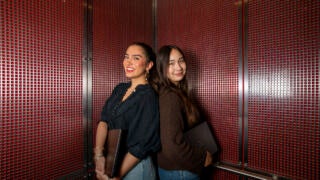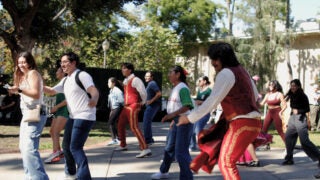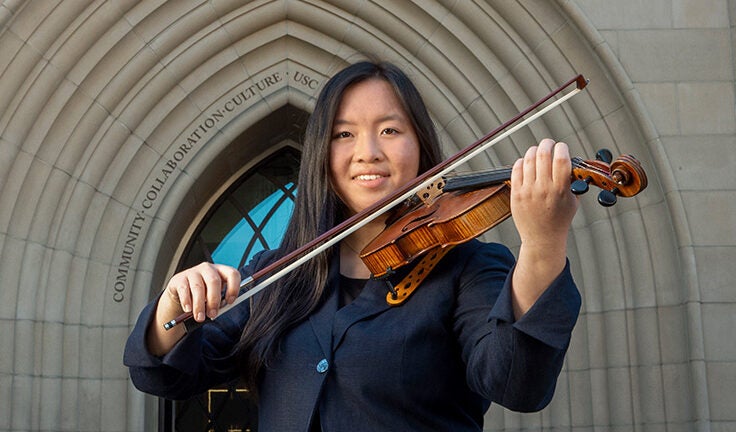
Emily Hsu finds that business and music are in harmony.
Art or Science? Dance or Math? USC Students Can — and Do — Choose Both
If Emily Hsu had a bad day as a teenager, she turned to a familiar source of comfort: her violin.
“I would feel so much better after playing,” she says. “After a really hectic day, playing something that’s relaxing can help me settle down and put me in a better mood before I start my homework.”
She has studied the instrument since age 5 and knew it would always be a big part of her life. But the native of San Jose, Calif., also wanted to pursue interests outside of music.
“That’s part of why I was so drawn to USC,” Hsu says. “It has such diverse areas of study and Renaissance ideals — the idea of encouraging students to pursue different fields.”
Now the 20-year-old sophomore is on track for a double major in violin performance at the USC Thornton School of Music and business administration at the USC Marshall School of Business. She also manages the Student Symphony Orchestra and envisions a career that blends her passions.
Hsu forged her own academic path at USC, one of many fellow Trojans who find creative ways to blend their artistic talents with interests in other disciplines such as business, science, linguistics and more. We asked a few of these modern-day Renaissance scholars about how they pursue their passions without limits.
Aspiring Occupational Therapist Mixes Movement and Mind
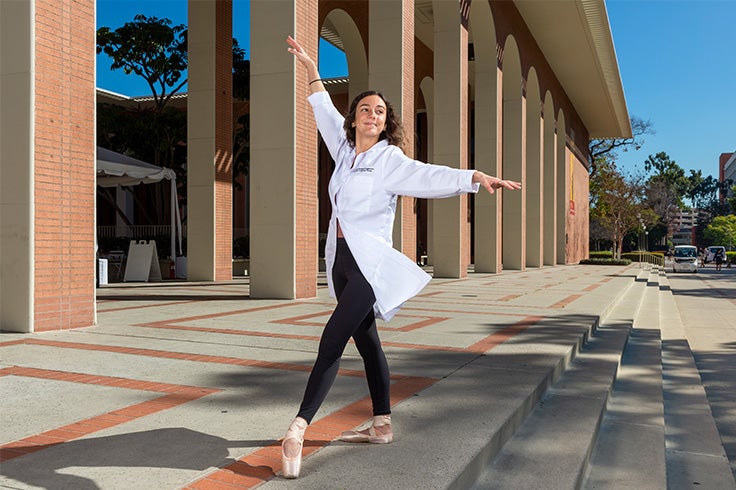
Like many busy college students, Claire Needham sometimes felt overwhelmed. “Having dance as a way to cope…was really helpful,” she says.
Needham’s years of training in classical ballet gave her an outlet for stress as she completed her neuroscience degree in 2021 at the USC Dornsife College of Letters, Arts and Sciences. She also minored in dance at the USC Kaufman School of Dance. Now the 22-year-old is studying for her master’s in occupational therapy at the USC Mrs. T.H. Chan Division of Occupational Science and Occupational Therapy.
Her studies in dance and neuroscience also gave her insight into the links between the two fields.
I became fascinated with the brain and how the mind and body work together. I am a very logical, practical person, but at the same time, growing up dancing, there was a lot of movement in my life.
Claire Needham
“I became fascinated with the brain and how the mind and body work together,” Needham says. “I am a very logical, practical person, but at the same time, growing up dancing, there was a lot of movement in my life.”
Her teachers at USC Kaufman emphasized those connections, encouraging her to go beyond the mechanics of dance to see how movement influenced her emotions and physical sensations. It reminded Needham of when her mother told her she always seemed happy after dance practice.
“That made me realize how much it does impact my mood and spirit,” she says. “Through that, I found other ways to incorporate that practice. I began running more, and that helped me slow down, think better and create a relaxing space.”
Needham plans to keep dancing as a personal pursuit, but she also wants to incorporate movement in her work as an occupational therapist. When she volunteered at a pediatric clinic, many of her patients were children with learning differences or who were on the autism spectrum. She found that sometimes the best way to engage with them was getting them to stand up and move, dance and jump around.
Asked for advice for Trojans who want to explore their creative passions, Needham encouraged them to check out student clubs or enroll in classes at one of USC’s six arts schools. She joined the student-led Chamber Ballet Company and took an introductory drawing class at the USC Roski School of Art and Design.
“Take advantage of all the things USC has to offer,” she says. “Even if you have a little bit of interest in something that isn’t necessarily, quote unquote, on your path, you should try it.”
Communication is Key for Theater and Language Student
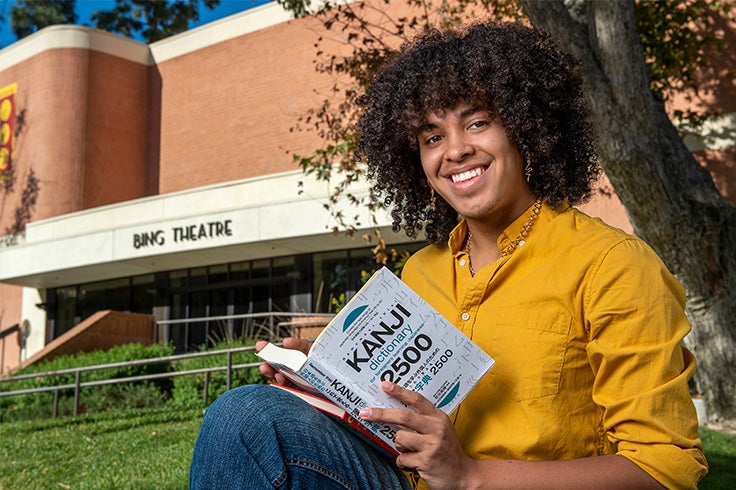
Rafael “Rafi” Perez loves language.
Born into a bilingual home, he grew up speaking English and Spanish. At 15, he picked up Catalan to keep up with his cousins in Spain. Five years of Chinese classes gave him conversational Mandarin skills. He learned basic Japanese while interning in a medical clinic for Japanese expats in Atlanta. Bored during the COVID-19 lockdown, he decided to learn French to chat with pals in Paris.
Why dedicate so much time to learning these languages? For Perez, it’s all about connection.
Every time I meet someone who speaks a different native language, I want to speak to them in that language.
Rafael Perez
“There is this quote from Nelson Mandela that really struck me: If you speak to someone in a language they know, it goes to their brain. But if you speak to someone in their native language, it goes to their heart,” he says. “Every time I meet someone who speaks a different native language, I want to speak to them in that language.”
That passion for communicating extends beyond the spoken word. Perez is also a student of the stage. The 19-year-old took singing lessons and performed in musical theater since he was a child. At USC, he brings his language and acting talents together: Along with his major in theatre at the USC School of Dramatic Arts, the first-year student plans to minor in Japanese, Chinese or linguistics in East Asian languages.
“Everything we do involves language,” he says. “Acting and theater [have] never been limited to English and Anglophone speakers. The fact that I’m able to break into Spanish theater or French theater or even Chinese theater is really special to me. I feel like I’m reaching into a whole different world and way of thought and expression.”
Perez also is passionate about bringing visibility to different groups through his acting. At his high school in Atlanta, he helped launch diversity, equity and inclusion initiatives and led an affinity group for multiracial and multiethnic students. As he pursues a career in film, television and music, he hopes to represent populations whose stories are less often told.
“I’m definitely going to be representing my Black people, my Hispanic people, my Catalan people, my gay people, my slash nonconforming slash people who don’t believe in gender,” he says. “I’m also Buddhist. I feel like I’m very out there and eccentric, and I want to show people that it’s OK to be that.”
For now, he’s looking forward to meeting new people and having new experiences at USC, including taking dance classes at USC Kaufman. Although he’s just starting out as a Trojan, Perez has advice for other students looking to make the most of their time at USC: “Live in the moment. Experience the people you are with right now. Who knows? They could be the most important people to you in the future.”
What Do Dance and Business Have in Common?
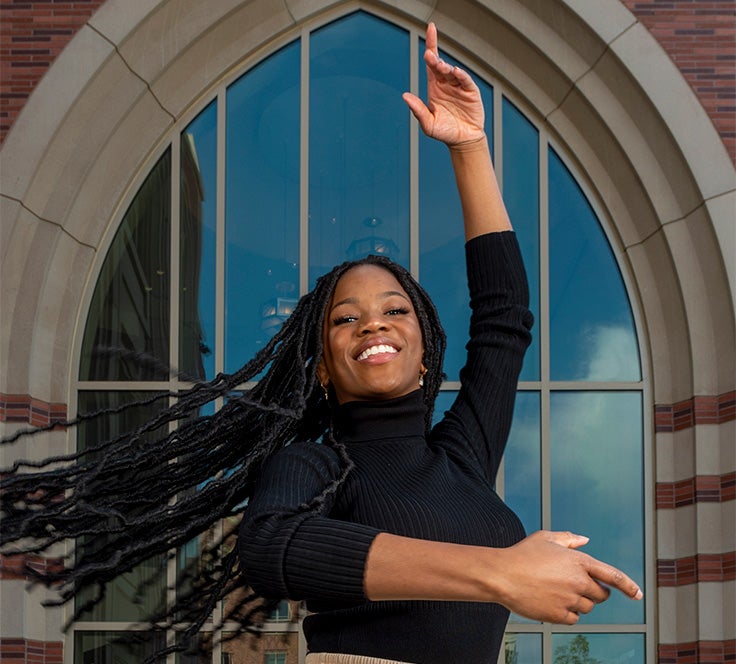
Nina Gumbs knew early on she wanted to pursue dance in college. But she also wanted to study at a university that resembled her high school education — a blend of academic classes and performing arts.
Growing up in Bowie, Md., Gumbs spent hours at the studio where her mom also was a teacher. Although she was a “studio kid,” she struggled at a young age with stage fright and refused to enroll. Eventually, after repeatedly watching from the audience as the older girls performed turns and jumps, Gumbs decided to take the leap. “I took my first class and hit the stage, and then you couldn’t get me off it,” she says. Since then, she’s found a home in jazz dance, but she has trained in many styles, including hip-hop, contemporary, lyrical and ballet.
“I like the dichotomy of academics and the arts,” she says. “I like structures where I can spend hours working on my craft, choreographing, directing, performing and creating art through movement. I can also spend hours sitting down at a computer researching, reading, learning how business really works, and I’m really grateful I landed at a place like USC, where I can do both.”
Now a senior, Gumbs found that balance as a dance major at USC Kaufman with a minor in entrepreneurship at USC Marshall. During the COVID-19 pandemic, the jazz dance specialist launched a company that focuses partly on helping dancers better understand the business of dance, what it takes to advocate for their pay and how to structure in their businesses and their careers to derive value in the industry.
“This idea of starting a business related to dance really started because I looked up one day and thought, ‘Am I going to be able to afford my rent? after I graduated?’” she says. “The answer kept being no, but I couldn’t accept that. So I tried to look at it a different way and think about how I could turn my art and craft into something that could make money and become a sustainable business. I knew dance studios were a business, but I was just starting to understand dance as a business. If you don’t understand the business and how your skills and talents fit the business, how can you change it or get better outcomes?”
Her interest inspired her to launch Good Company Enterprises, a venture that lets her consult with dancers and directors, choreograph performances, teach dance classes and speak to audiences about the importance of movement.
Dance is all around us all the time. You can’t avoid it, and it’s been such a backbone of this country, much like music.
Nina Gumbs
“At Good Company, we look to people who don’t understand or aren’t very interested in the business side of dance and use the interaction to educate them about why dance is, in fact, a valuable pursuit and help them become better directors, collaborators and business owners,” she says. “Dance is all around us all the time. You can’t avoid it, and it’s been such a backbone of this country, much like music.”
She is still figuring out her next steps after graduating in the spring, but she hopes to continue developing business initiatives like The Good Company. Gumbs is signed with Clear Talent Group, a talent agency, and plans to audition this spring in Los Angeles and New York for contemporary and commercial dance companies. At the heart of whatever she tackles next, however, will be an effort to strike a balance between dance and business.
“There will always be a conflict, because when you think of business, it can feel very money-driven and about numbers,” she says. “I’ve seen it firsthand, being in entrepreneurship and how people think in those business classes. I find it fascinating. It’s like a language barrier, though, between feeling and expression versus the numbers that support that expression.”

